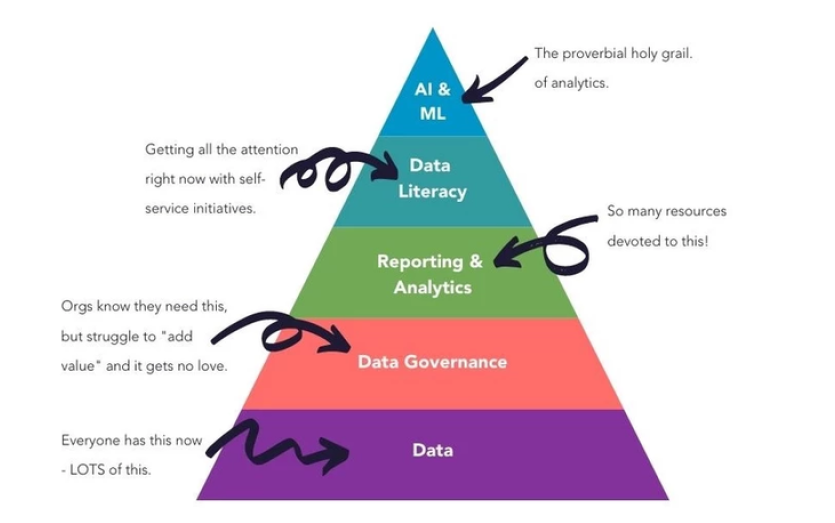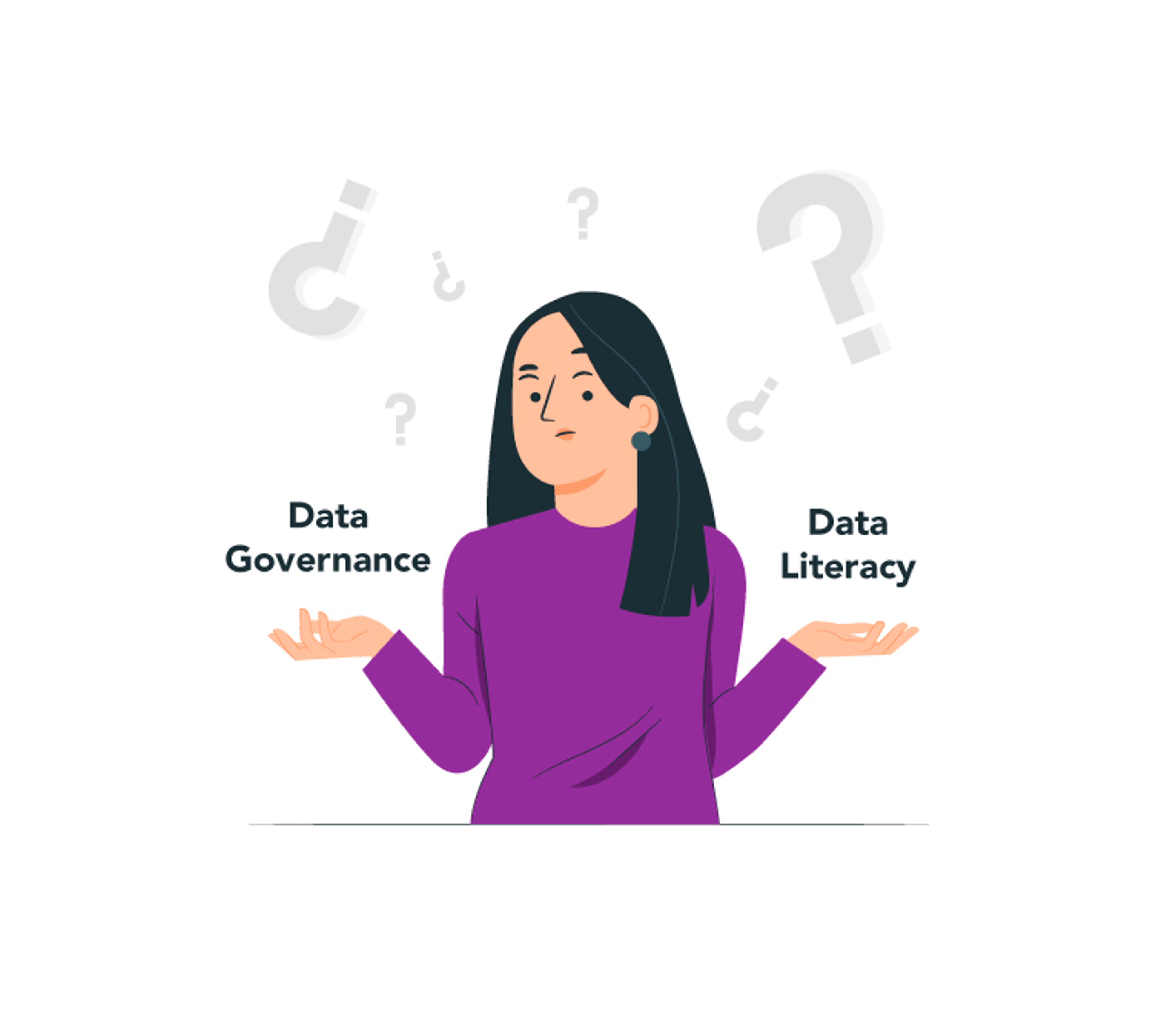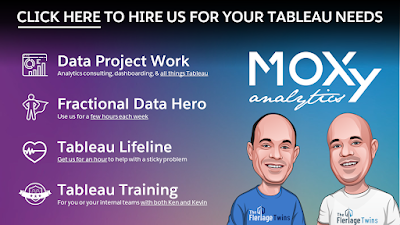Data Governance Literacy (Guest Post from Laura Madsen)
This is a guest blog post from Laura Madsen. Based in Minneapolis, Minnesota, Laura is the CEO of Moxy Analytics, a company she leads alongside her business partner, Serena Roberts. Laura is the author of numerous books related to data, analytics, and business intelligence which includes her most recent, Disrupting Data Governance: A Call to Action. We are super excited to have her on the site.
If you are interested in more content related to data literacy, governance, strategy, culture and how to prove the value of your data and analytics teams, please check out the free downloadable e-books on the Moxy Analytics Free Stuff page. And for even more content, check out the Moxy Analytics blog.
DATA GOVERNANCE LITERACY
How to build responsive & resilient data governance teams
WHAT IS DATA GOVERNANCE LITERACY?
In Disrupting Data Governance, Laura Madsen shared that data literacy has been a bellwether for the new/old shiny data governance programs. Data governance has been around for almost as long as the data warehouse but boy howdy have we struggled with it. It is the thing you love to hate, like reality TV or chocolate-covered fruit. Be that as it may, data governance is finally being given a makeover and is predicted to be a $5.1 billion industry by 2024.
If we all agree that data literacy, generally, “…is the ability to read, understand, create, and communicate data as information” (Wikipedia) and Data Governance, generally, “…is the orchestration of people, processes, and technology to manage the company’s critical data assets by using roles, responsibilities, policies, and procedures to ensure the data is accurate, consistent, secure, and aligns with the overall company objectives” (Gartner).
Then data literacy and data governance don’t have much in common except the word “data”, but it isn’t that simple. Most organizations that do data governance well have some kind of education or training associated with data governance. It is created to ensure that those working in data governance, the data owners, data stewards and the leadership stakeholders to read, understand, create, and communicate data as information…the needs are distinct from those that participate in data literacy though. Data governance literacy must ensure that those roles know what they do and how they do it ,from creating standard definitions to data quality parameters.

Initially considered to be a 101 and a 201 scenario, as in data literacy is a 101 class and 201 is a course for the advanced. But, after some careful analysis (I pulled a bit of a Don Draper; thought about it and walked away---not the part where he gulps down a bottle of brown liquor and blows up everyone else’s life with his careless eloquent words) it occurred to me that it is not a 101/201 problem. They are distinct efforts with their own goals. Almost by definition data literacy intends to increase self-service. Data governance literacy intends to help your organization either become or maintain its data-driven status. Data literacy is (usually) about improving individual skillsets for the greater good and data governance literacy is about the greater good. Will individual skillsets be improved if data governance literacy is successful? Sure, but that’s a by-product, not the end goal.

Using Maslow's hierarchy of needs as our inspiration we see foundational elements such as data and data governance as building blocks for data literacy and AI/ML.
WHAT'S THE GOAL?
The goal of data governance literacy is to ensure that your data owners, data stewards, and others that work in data governance have the skills they need to define data, set parameters, understand lineage (and its implications), and champion protection. Even if you’ve worked as a data analyst these functions are often distinct from most other activities in data.
Now before you roll your eyes and express frustration at yet another damn thing you must do, successful data governance programs have been doing this all along. It is the function of training staff to be successful in data governance. Now, we have a name and definition for it. But what we also have is an understanding that it is something that you should be doing if you have a data governance program. If you’ve wondered why you have struggled to be successful with data governance and have followed all the better practices but still can’t seem to get where you’re going, and don’t have something that supports data governance literacy, now you know why you’re not gaining traction.
HOW TO GET STARTED
1) ASSESS
What do you have that you can re-use? Start with content from your data catalog or data literacy programs.
2) GO TO THE EXPERTS
Ask your data stewards what resources would be helpful to them in their journey.
3) START A BACKLOG
Keeping track of the content you want to build for your data governance literacy program should be part of your overall data governance strategy.
STEP ONE: ASSESS
Before you start to worry too much about adding more to your already overloaded to-do list, check out what you already have that you use to support your data governance team. Do you have training for your data catalog? Could it be adapted to add different functions or roles (like part-time data stewards)?
Next, look to your data literacy program. While data governance literacy is specifically about training the data governance team you may find content in your data literacy program that can help fill the gap. Remember, the first category of data governance is to increase the usage of data and data literacy programs aim to do that as well.
Finally, keep in mind that you can create short, simple content to put on your learning management system (LMS) so as projects add data stewards they get trained right away, freeing you up in the long run!
STEP TWO: SEEK OUT EXPERTS
The best resource you have to determine what content you need to increase your data governance literacy are your data stewards. If they're doing the job already they know what it took to get skilled. If they are new to the role they will have perspectives as to what they need to learn or understand to be successful at the role.
The function of data owner is different from data stewards but they will likely have insight for you into what is the most important things they need to know to be successful. If you're lucky enough to have a training resource group in your organization they can be excellent resources to help you construct relevant, informative content.
If you have none of these resources in your organization and you're just getting started there is a proposed curriculum in this eBook that can help. If you're lucky enough to have a training team in your organization they may be able to help you put the content together.
STEP THREE: START A BACKLOG
Whether or not you follow agile practices, it's a good idea to begin a checklist for what you want to build for your data governance literacy efforts. After you've assessed what you already have and have discussed it with the experts in your organization write it down. Break it out into smaller, iterative work efforts and review it with your executive stakeholders.
Building a data governance literacy program shouldn't be an add-on, it should be a key element in your efforts to improve your data governance program. Embed the data governance literacy backlog into the program backlog or add it to your project for prioritization if you follow traditional project management.
Data Governance Literacy should help train and upskill the key roles in da ta governance. Preparing them to define, manage, and communicate about the data is a step often above and beyond for data governance but will improve the likelihood of success.
PROPOSED CURRICULUM
Thanks so much for reading.
Laura
If you are interested in more content related to data literacy, governance, strategy, culture and how to prove the value of your data and analytics teams, please check out the free downloadable e-books on the Moxy Analytics Free Stuff page. And for even more content, check out the Moxy Analytics blog.
Need help with anything related to Tableau? Through Moxy Analytics, Ken and I provide consulting services such as Tableau Lifeline (get us for 1 hour to help solve sticky problem), Fractional Data Here (get us on your team for N number of hours a month for whatever you want us for), Tableau Training, and of course, project work. Click the Icon below if you are interested.
Kevin Flerlage, July 31, 2023
Twitter | LinkedIn | Tableau Public



























No comments: